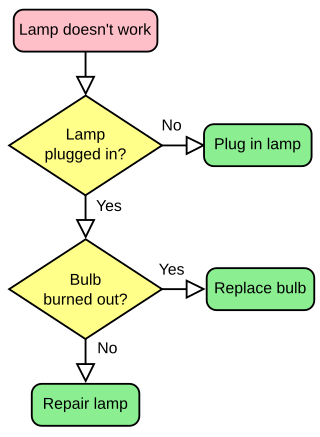An instructional theory is "a theory that offers explicit guidance on how to better help people learn and develop." It provides insights about what is likely to happen and why with respect to different kinds of teaching and learning activities while helping indicate approaches for their evaluation. Instructional designers focus on how to best structure material and instructional behavior to facilitate learning.

Knowledge management (KM) is the collection of methods relating to creating, sharing, using and managing the knowledge and information of an organization. It refers to a multidisciplinary approach to achieve organizational objectives by making the best use of knowledge.
Organizational learning is the process of creating, retaining, and transferring knowledge within an organization. An organization improves over time as it gains experience. From this experience, it is able to create knowledge. This knowledge is broad, covering any topic that could better an organization. Examples may include ways to increase production efficiency or to develop beneficial investor relations. Knowledge is created at four different units: individual, group, organizational, and inter organizational.

Knowledge transfer is the sharing or disseminating of knowledge and the providing of inputs to problem solving. In organizational theory, knowledge transfer is the practical problem of transferring knowledge from one part of the organization to another. Like knowledge management, knowledge transfer seeks to organize, create, capture or distribute knowledge and ensure its availability for future users. It is considered to be more than just a communication problem. If it were merely that, then a memorandum, an e-mail or a meeting would accomplish the knowledge transfer. Knowledge transfer is more complex because:
Tacit knowledge or implicit knowledge—as opposed to formal, codified or explicit knowledge—is knowledge that is difficult to express or extract, and thus more difficult to transfer to others by means of writing it down or verbalizing it. This can include personal wisdom, experience, insight, and intuition.
In business, a competitive advantage is an attribute that allows an organization to outperform its competitors.

In psychology, decision-making is regarded as the cognitive process resulting in the selection of a belief or a course of action among several possible alternative options. It could be either rational or irrational. The decision-making process is a reasoning process based on assumptions of values, preferences and beliefs of the decision-maker. Every decision-making process produces a final choice, which may or may not prompt action.

In psychology, cognitivism is a theoretical framework for understanding the mind that gained credence in the 1950s. The movement was a response to behaviorism, which cognitivists said neglected to explain cognition. Cognitive psychology derived its name from the Latin cognoscere, referring to knowing and information, thus cognitive psychology is an information-processing psychology derived in part from earlier traditions of the investigation of thought and problem solving.
Knowledge workers are workers whose main capital is knowledge. Examples include programmers, physicians, pharmacists, architects, engineers, scientists, design thinkers, public accountants, lawyers, editors, and academics, whose job is to "think for a living".
Encapsulated knowledge is the value endowing meta-resource originating from thought, reflection, or experience that is embedded in an artefact’s design and functionality.
Corporate amnesia is a phrase used to describe a situation in which businesses, and other types of co-operative organization, lose their memory of how to do things. The condition is held, by some people, to be analogous to individual amnesia.
Organizational memory is the accumulated body of data, information, and knowledge created in the course of an organization's existence. The concept of organizational memory includes the ideas of components knowledge acquisition, knowledge processing or maintenance, and knowledge usage like search and retrieval. Falling under the wider disciplinary umbrella of knowledge management, it has two repositories: an organization's archives, including its electronic data bases; and individuals' memories.
A community of practice (CoP) is a group of people who "share a concern or a passion for something they do and learn how to do it better as they interact regularly". The concept was first proposed by cognitive anthropologist Jean Lave and educational theorist Etienne Wenger in their 1991 book Situated Learning. Wenger then significantly expanded on the concept in his 1998 book Communities of Practice.
Knowledge sharing is an activity through which knowledge is exchanged among people, friends, peers, families, communities, or within or between organizations. It bridges the individual and organizational knowledge, improving the absorptive and innovation capacity and thus leading to sustained competitive advantage of companies as well as individuals. Knowledge sharing is part of the Knowledge management process.
A knowledge organization is a management idea, describing an organization in which people use systems and processes to generate, transform, manage, use, and transfer knowledge-based products and services to achieve organizational goals.
Traditional ecological knowledge (TEK) describes indigenous and other traditional knowledge of local resources. As a field of study in Northern American anthropology, TEK refers to "a cumulative body of knowledge, belief, and practice, evolving by accumulation of TEK and handed down through generations through traditional songs, stories and beliefs. It is concerned with the relationship of living beings with their traditional groups and with their environment." Indigenous knowledge is not a universal concept among various societies, but is referred to a system of knowledge traditions or practices that are heavily dependent on "place". Such knowledge is used in natural resource management as a substitute for baseline environmental data in cases where there is little recorded scientific data, or may complement Western scientific methods of ecological management.
The following outline is provided as an overview of and topical guide to knowledge:
Communities that support innovation have been referred to as communities of innovation (CoI), communities for innovation, innovation communities, open innovation communities, and communities of creation.
Text and conversation is a theory in the field of organizational communication illustrating how communication makes up an organization. In the theory's simplest explanation, an organization is created and defined by communication. Communication "is" the organization and the organization exists because communication takes place. The theory is built on the notion, an organization is not seen as a physical unit holding communication. Text and conversation theory puts communication processes at the heart of organizational communication and postulates, an organization doesn't contain communication as a "causal influence", but is formed by the communication within. This theory is not intended for direct application, but rather to explain how communication exists. The theory provides a framework for better understanding organizational communication.

Polanyi's paradox, named in honour of the British-Hungarian philosopher Michael Polanyi, is the theory that human knowledge of how the world functions and of our own capability are, to a large extent, beyond our explicit understanding. The theory was articulated by Michael Polanyi in his book The Tacit Dimension in 1966, and economist David Autor gave it a name in his 2014 research paper "Polanyi's Paradox and the Shape of Employment Growth".




